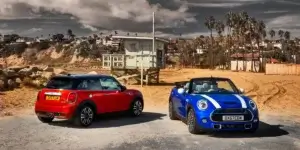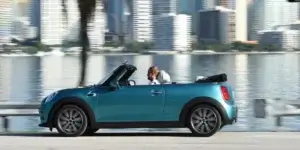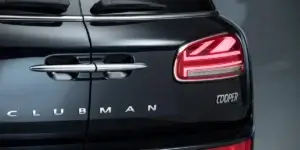If you’re considering a Mini for your next car, you may find yourself wondering, “What exactly is a Mini Cooper?” It’s a common question, given the frequent use of the ‘Cooper’ name across various Mini models. Is it a standalone model, a specific trim level, or something else entirely? This guide will explain the Mini Cooper range and help you understand its place within the Mini lineup.

What is a Mini Cooper?
Contrary to what you might think, the Mini Cooper isn’t a standalone model like the Ford Fiesta. Instead, ‘Cooper’ is a trim level available across several Mini models. Specifically, you’ll find the Cooper trim on the 3-Door Hatch, 5-Door Hatch, Convertible, Clubman, and Countryman.
However, Mini sometimes places ‘Cooper’ before the model name (e.g., Mini Cooper Convertible) and sometimes after (e.g., Mini Countryman Cooper). Despite this, the Cooper name always represents a trim level, not a separate model.
What does a Mini Cooper look like?
The Cooper trim typically offers more standard equipment, greater power, and a sportier appearance compared to Mini’s base-level trims.
Since 2013, petrol Cooper models have featured a 1.5-litre engine with 134bhp, while diesel Coopers come with either a 1.5-litre engine producing 114bhp or a 2.0-litre engine producing 148bhp, depending on the model.
When it comes to exterior identification, you’ll find a Cooper badge in the bottom right corner of the boot lid. However, given the vast array of customisation options Mini offers—including different wheels, colour combinations, stripes, and stickers—visual variations are plentiful, especially in the used car market.

What is the Mini Cooper S?
For those craving a bit more power and performance, the Mini Cooper S steps up the game. The ‘S’ variant is a sportier version of the Cooper trim, easily recognised by the slot in the bonnet above the Mini logo and the ‘S’ badge on the front grille.
Since 2013, Cooper S models have been equipped with a 189bhp petrol engine or a 168bhp diesel engine, both 2.0-litres in size. However, for those looking for an even sportier experience, the high-performance John Cooper Works (JCW) models go beyond with over 200bhp, upgraded suspension, and brakes. You can identify these models by the John Cooper Works badge on the front grille.
Where does the Cooper name come from?
The legacy of the Mini Cooper dates back to the late 1950s with Cooper Cars, a successful motor racing team led by John Cooper. Recognising the potential of the newly released Mini, John Cooper began selling upgraded engine, brake, and suspension parts to Mini enthusiasts who wanted to go faster and have more fun.
These upgrades transformed the Mini into a winning race car, prompting the British Motor Corporation (BMC) to sell Cooper-upgraded Minis through their official dealerships. Thus, the Mini Cooper was born. When BMW acquired the Mini brand in 1994, they continued this legacy, introducing an all-new Mini in 2000, which has since evolved into today’s models.

Other Mini Trim levels
Besides the Cooper trims, Mini offers a range of trim levels to suit different preferences and budgets. Here’s the hierarchy:
- One: The entry-level trim with basic features.
- Cooper: Adds more standard equipment and power.
- Cooper S: A sportier version with more horsepower.
- John Cooper Works (JCW): The performance-focused variant with advanced features and high horsepower.
Since 2019, Cooper and Cooper S models have been available in three different packages—Classic, Sport, and Exclusive—each offering unique equipment and styling details. Plus, there are special-edition models like the Challenge 210, 1499GT, and Seven, featuring unique colour combinations, styling elements, and equipment packages.

What are the different Mini models?
Mini’s lineup includes five main models. Here’s a closer look at each:

3-Door Hatch
The iconic 3-Door Hatch is known for its compact size, making it ideal for city driving. It’s comparable in size to the Ford Fiesta, making it nimble and easy to park.
5-Door Hatch
A bit longer than the 3-Door, the 5-Door Hatch offers additional rear passenger space and a pair of extra doors for easier access.
Convertible
For those who love the wind in their hair, the mini Convertible features an electrically operated fabric roof that folds down behind the back seats.

Clubman
The Clubman estate is similar to the Ford Focus, providing more interior and cargo space while retaining Mini’s signature style.

Countryman
The largest in the lineup, the Countryman is an SUV that offers more boot space and a taller ride height. The Cooper SE variant even features plug-in hybrid power with up to 26 miles of electric-only range.
Mini Electric
Launched in 2020, the Mini Electric features an electric motor and a battery range of up to 145 miles. Instead of traditional trim levels like Cooper, its trims are named Level 1, Level 2, and Level 3.
Special Mentions
In addition to the current models, you might come across older Mini models in Cooper trim, such as the sporty, two-seat Coupe and Roadster soft-top, and the Paceman, a three-door coupe SUV. These models add even more variety to the Mini family.
Final Thoughts
The Mini Cooper range offers a variety of models and trims to suit different needs and preferences. From the compact 3-Door Hatch to the spacious Countryman SUV, there’s a Mini for everyone. Understanding the different trims and models can help you make an informed decision when purchasing your next used Mini. For more information and to browse available models, visit MOTORS.


